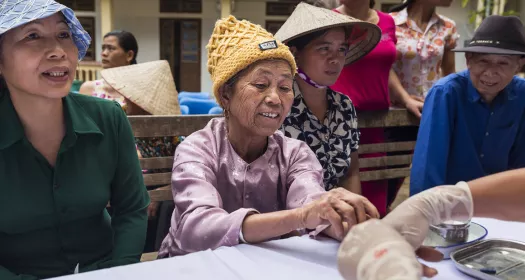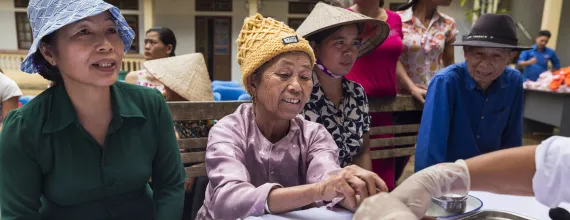For maximum impact and long-term sustainability, local authorities and decision makers should own the cardiovascular (CV) population health approach, starting with priority setting and design. The CARDIO interventions that are the most useful in a certain context (according to the priority setting) can then be co-developed and planned with all partners in the multisector collaboration. Usually, a local steering committee, chaired by city authorities, with representatives from all sector partners, is formed to drive and oversee the implementation of the population health approach and its measurement system. This allows to continuously monitor progress, outcomes and impact, and provides regular opportunities to adjust interventions if necessary. As the chair of the steering committee, city authorities must own the urban population health approach, also because most of the CARDIO interventions should be funded by local resources.
Ensure local ownership
- From the onset, ensure health authorities are in the driver seat to provide accountability and ownership, and co-design interventions and solutions based on their priority health needs
- Beyond health authorities, create ownership among local multisector partners, patient/professional associations and community members, so all can commit to the objectives, plan and outcomes of the population health approach and ensure long-term buy-in. Ideally, this happens by forming a steering committee with representatives from all partners and chaired by city health authorities
- Openly discuss what works and what doesn’t in the steering committee, and use collected evidence to make joint strategic decisions
- Involve end users, such as health providers and patients early on to support the development of interventions that are tailored to their needs, hence also increase their future adoption
- Fund the majority of interventions locally to ensure sustainability and scale, and foster accountability
The indicators below can come from a variety of sources (primary and secondary data collection, national or regional surveys and databases).
Evaluation of the co-creation planning process
- Establishment of the steering committee for the CV population health approach
- Diverse stakeholder representation (government, NGO, academic, professional associations, patient associations, private sector, civil society, etc.)
- Validated roadmap and operational plan for improving CV health
- % of funding by local stakeholders/other
- Intervention design reflects the needs of both the co-creators in the steering committee and the end users
Stakeholder-owned/funded interventions in operational plan – including but not limited to:
- Update of hypertension and CV risk reduction guidelines with latest available evidence and standardization of CV risk management
- Training and continuous medical education of health workers and supportive supervision of primary health services
- Hypertension patient registry or other form of patient data collection to monitor the cascade of care (screened, diagnosed, treated, controlled)
- Increased health literacy of patients and their families, leading to improved self-management
Progress, outcome and impact monitoring of the CARDIO interventions implemented
- % of population covered with access to improve quality of care and preventive services
- % of hypertension patients diagnosed, treated, controlled
- % of primary health budget and funding dedicated to CV care (there may be joint metrics with other CV risk factors)
- # of acute CV events avoided
- # of policies with proven health benefits that have been promoted (e.g., tobacco or sugar tax, total ban on salt and trans fat in processed food, etc.)
- Impact measurement of policies introduced
Additional external resources
Better Hearts Better Cities Dakar (French)
Better Hearts Better Cities Sao Paulo (Portuguese)
- Cuidando de todos: DCNT Doenças Crônicas Não Transmissíveis na Atenção Primária à Saúde (APS) Protocolo Clínico Prático para o Tratamento de Doenças Crônicas Não Transmissíveis (DCNT) na Atenção Primária à Saúde (APS): Hipertensão Arterial e Diabetes Mellitus
Caring for all: NCDs Chronic Non-Communicable Diseases in Primary Health Care (PHC) Practical Clinical Protocol for the Treatment of Chronic Non-Communicable Diseases (CNCD) in Primary Health Care (PHC): Arterial Hypertension and Diabetes Mellitus - Cuidando de todos: DCNT doenças crônicas não transmissíveis na atenção primária à saúde do msp protocolo da linha de cuidado das doenças crônicas não transmissíveis (DCNT) na atenção primária à saúde (APS) do município de São Paulo. 2020
Reference documents and literature
- Monitoring and evaluation framework for hypertension control programs: A collaboration between the Pan American Health Organization and the World Hypertension League. 2018
- Patient-Centered Care: Improving Hypertension Outcome Measurement in Lowand Middle-Income Countries. Hypertension. 2019;73:990-997
- Framework, principles and recommendations for utilising participatory methodologies in the co-creation and evaluation of public health interventions. Research Involvement and Engagement volume 5. 2019
Recommendations described herein were developed by the Novartis Foundation and/or its partners as part of the Better Hearts Better Cities and other initiatives; before local implementation, interested parties must ensure compliance with all applicable laws and regulations, including local industry codes and institutional policies. Links and content may be subject to change without notification.
The Terms of Use of the Novartis Foundation apply.









